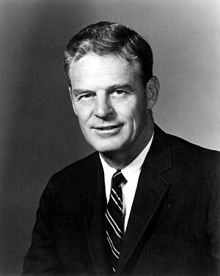Edward J. Gurney
| Edward John Gurney | |
|---|---|
 |
|
|
United States Senator from Florida |
|
|
In office January 3, 1969 – December 31, 1974 |
|
| Preceded by | George Smathers |
| Succeeded by | Richard Stone |
| Member of the U.S. House of Representatives from Florida's 5th district |
|
|
In office January 3, 1967 – January 3, 1969 |
|
| Preceded by | Albert S. Herlong, Jr. |
| Succeeded by | Louis Frey, Jr. |
| Member of the U.S. House of Representatives from Florida's 11th district |
|
|
In office January 3, 1963 – January 3, 1967 |
|
| Preceded by | New district |
| Succeeded by | Claude Pepper |
| Personal details | |
| Born |
January 12, 1914 Portland, Maine |
| Died | May 14, 1996 (aged 82) Winter Park, Florida |
| Political party | Republican |
| Alma mater |
Colby College Harvard Law School Duke Law School |
| Religion | Congregationalist |
| Military service | |
| Service/branch | United States Army |
| Years of service | 1941–1946 |
| Rank | Lieutenant Colonel |
| Battles/wars | World War II |
Edward John Gurney (January 12, 1914 – May 14, 1996) was an attorney and an American politician based in Florida, where he served as a Representative and a United States Senator. Born and reared in Portland, Maine, Gurney moved to Florida after his service in World War II. Becoming active in politics in the Democratic Party, he shifted to the Republican Party before being elected to the House of Representatives in 1962, the second Republican elected to Congress from Florida in the 20th century.
In 1968 Gurney was elected as the first Republican Senator from Florida since Reconstruction. Indicted in an influence peddling scandal in 1974, he resigned December 31, 1974. Eventually he was acquitted of all charges. After being defeated in a run for Congress in 1978, Gurney retired from politics and resumed his law practice.
The Republican Party (anti-slavery) had been shrinking in the South since Reconstruction, due to conservative white efforts to suppress the black vote and civil rights. At the time, blacks made up most of the Republican Party. Disenfranchisement of African Americans came through new state constitutions and laws which established the Jim Crow south and domination by conservative, white Democrats.
Florida effectively became a one-party, white Democratic-dominated state for decades. In 1962 Gurney was only the second member of the now conservative Republican Party, to be elected to Congress from Florida. He and others were building a new Republican party based on white conservatives. After Democrats fought for blacks to regain the right to vote, most African Americans in the South shifted their allegiance to the more liberal Democratic Party that had supported the civil rights movement.
Gurney was born in Portland, Maine in 1914. He attended public schools and graduated in 1935 from Colby College in Waterville, Maine. He graduated in 1938 from Harvard Law School. He was admitted to the Bar of New York the following year and began practicing law in New York City.
...
Wikipedia
